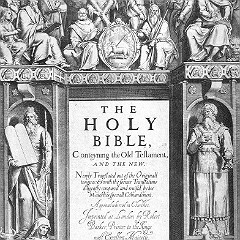
Well, Alter now has a new book about the King James Bible and its influence on the style of six American novelists: Herman Melville, Ernest Hemingway, William Faulkner, Saul Bellow, Marilynne Robinson, and Cormac McCarthy. It’s called Pen of Iron, a title taken from Jeremiah 17.1.
The idea might strike some as a bit esoteric, but I think there’s something important here. Alter speaks of the King James Bible as “determin[ing] the foundational language and symbolic imagery of a whole culture” in America. Beautiful, lyrical, impactful language has staying power. Next year marks the 400th anniversary of the King James Bible. Four hundred years, and the translation is still ringing in our ears. Despite fading “fervid faith in Scripture as revelation,” says Alter, “the language of the Bible remains an ineluctable framework for verbal culture in this country.”
But is the iron pen showing signs of rust? Alter points out that the 300th anniversary was publicly celebrated by such luminaries as Teddy Roosevelt and Woodrow Wilson. He suspects that scholars will be the main group in observance for 2011. I think that would be a shame if it came true.
All of this brings to mind a few questions: What do you think of the influence of the King James Bible on American culture? Has it had an impact on you personally? Do you think that contemporary translations trade long-term cultural impact for accessibility? And finally, even more speculative than the last, do you think any modern translations potentially have the staying power that the KJV has had?












